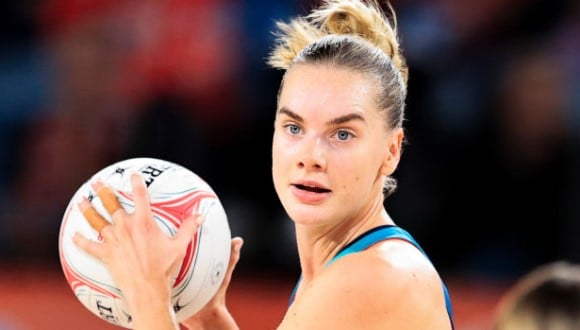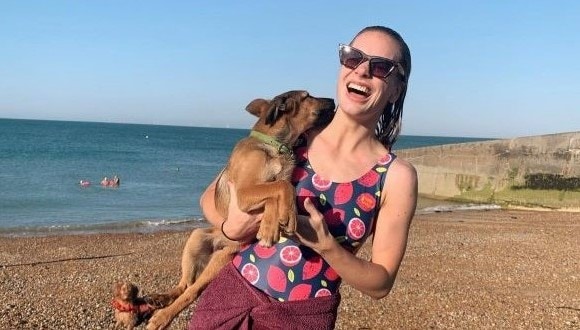Super Netball star Kiera Austin: How I’m preparing for life after sport
Published April 2023 | 4 min read
Words by Lucy E Cousins
Although she’s playing at the top of her game, this dynamic athlete is carefully planning her next career move and developing her passion for women’s health.
On any given day throughout her childhood, Super Netball player Kiera Austin could be found playing some sort of sport. From soccer to swimming and everything in between, she tried her hand (and feet) at it. Then, when she turned 15 – and much to the disappointment of her soccer-loving father – she decided that netball was the sport she was “naturally good at”. It was a good bet.
After making waves at the underage state and national competitions in her teens, at the age of 20 she earned a silver medal at the 2017 Netball World Youth Cup, and in 2018, she debuted in the Super Netball league for GIANTS Netball. In 2019, at the age of 22, she was selected for our national netball team, the Australian Diamonds.
As a player, Kiera is dynamic yet calm, fast yet accurate. An attacking all-rounder, she’s comfortable playing goal attack, goal shooter and wing attack, and when it comes to running the attack in the goal third, she’s a forthright leader.
Apart from the physicality of the sport, Kiera has always loved the team sport aspect of netball.
“I just loved the girls I played netball with, and now my best friends today are on the netball court,” she says. “So, it just seemed a natural fit and it's easy to stay in a sport as a job when you love the girls that you're playing with too.”

Life after Super Netball
As well as throwing herself into her successful sports career, Kiera, who now plays for the Melbourne Vixens, has always had one eye on the future.
“I think you at least need to have a goal for after sport, particularly for females, because we can't just fall into a coaching role or a commentary role as easily as the men do,” she says.
For Kiera, her mum’s career has always been a source of inspiration and as a teen she spent a lot of time talking to her mum about the patients she looked after.
“My mum was a nurse at St Vincent's Hospital in Sydney, and she would tell me about her patients,” she recalls. “It just always sparked an interest in me about how the body works.”
So, while still playing netball, Kiera enrolled in a medical science degree and hasn’t looked back. She’s hoping to work in the medical field at some point, perhaps even in an IVF or fertility clinic.
“I'm already asking myself, ‘After my degree, what kind of part-time job can I be doing so I'm getting experience?’” she says. “Because if you retire [from netball] and you haven't done any work experience, it's like you're starting from scratch.”
This is something Kiera thought about a lot when she tore her ACL (anterior cruciate ligament) in 2021. She was out for an entire season and transferred to the Vixens the following year. During her recovery, she reflected on how she wanted her retirement to play out.
“Most netballers retire around age 33 to 36, and I've definitely seen some [women] retiring with plans set in place, and others who haven't had any plans… and obviously one way goes a lot smoother than the other,” she says.

Planning a family as a female athlete
Women’s health and fertility in sport is a particular interest for Kiera; she’s passionate about female athletes understanding their biological clocks. She’s also a big advocate of female athletes talking about family planning early in their careers.
“I think it's just about having a conversation,” she says. “Every female athlete is going to be different, but your eggs do start dropping at 25, so there's a point at which you go, ‘I can probably still conceive in 10 years, but it's just going to be harder’. So it’s just about having those conversations, and not feeling like it's such a taboo subject."
When Kiera first started playing professionally there weren’t many mothers playing in the league, but she has seen a change over the past five years.
“There are at least six or seven mums playing in the league. Some players are at such a high standard that when they have a baby, they can bounce back quicker, so they've been able to secure a contract,” she says.
Facing retirement head on
Studying and training aside, gaining more experience off the court and deciding when to have children (she recently got engaged), is crucial for Kiera right now. She finishes her degree this year and is already starting to plan her post-netball life.
She advises new players to do the same, saying that they should “enjoy the moment, but always have some sort of future vision”. It helps, she adds, to say ‘yes’ to different opportunities in different areas, to get a feel for life outside of netball. For Kiera, though, she’s positive that the future will be bright.
“I'm excited for life after sport, because when I think about it, I know that I want to be a netballer until my early 30s,” she says. “Then, after that, I’ll hopefully have a whole new career. It’s exciting but scary at the same time!”
RELATED ARTICLES
BENEFITS OF PLAYING NETBALL
The health benefits include fitness and bone strength, but the social and wellbeing benefits are also significant.
BENEFITS OF TEAM SPORTS
From helping you beat loneliness to scoring goals at work, being part of a sporty squad can be a winning move.
UNDERSTANDING FERTILITY
Getting to know your cycle is essential when trying to have a baby, with only a small window of opportunity each month.
IVF: WHAT TO EXPECT
IVF can be emotional and overwhelming for couples trying to get pregnant. Find out what it’s really like.